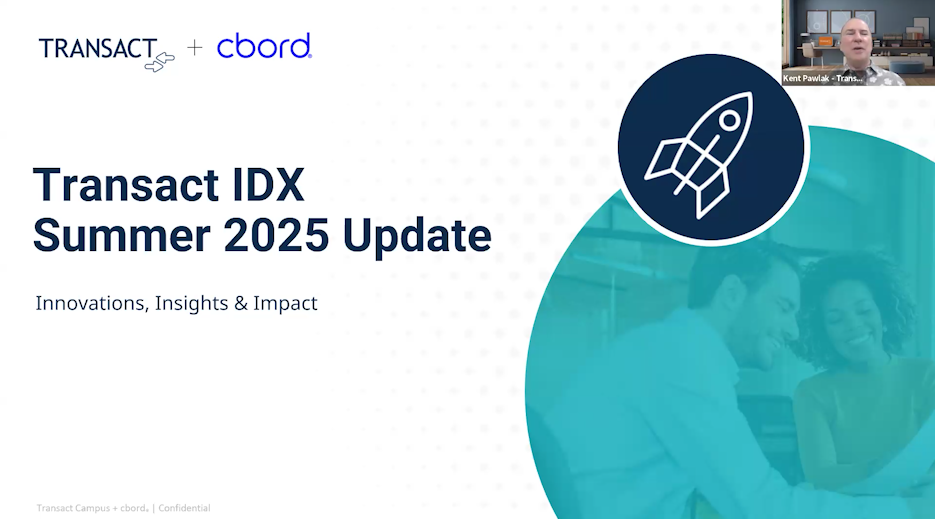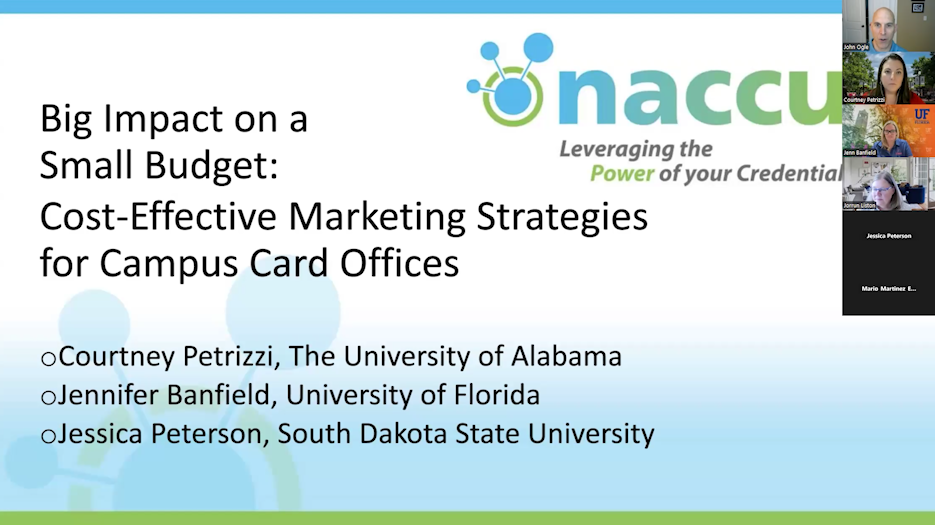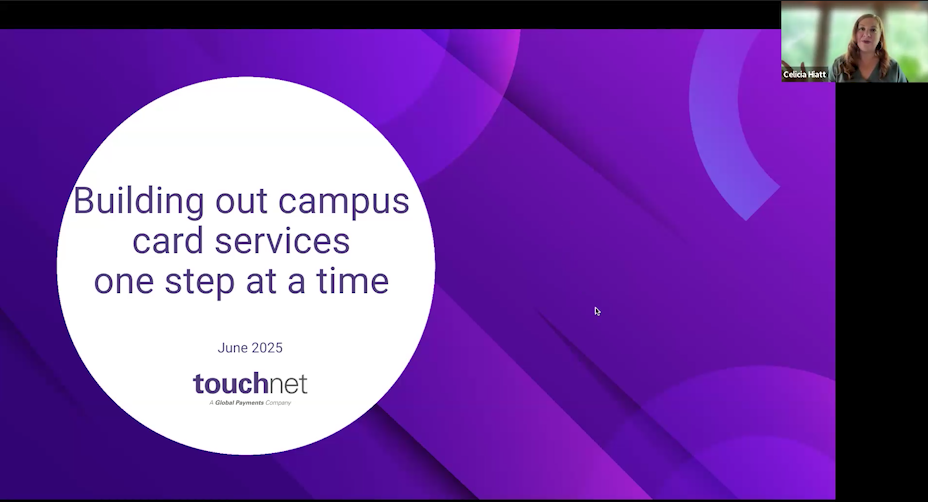High Impact Training, NACCU Style: Data, Decisions, and the Card Office
High-Impact Training, NACCU Style: Data, Decisions, and the Card Office
Sponsored by HID Global Recorded Wednesday, September 30, 2020
Three speakers take on different aspects of the importance of the data we manage and how it can be leveraged to improve processes and service in short, visually-impactful presentations.
How Data Drives Daily Decisions
Jessica Bender, MBA, CASP; Auxiliary Services Manager, Palm Beach State College
The Role of Analytics in Thinking Bigger
Mike Perkins, IT Associate Director for Business Analytics, University of Georgia
Best Practices in Data Sharing & Integration
Emily Dieker, Director, GWorld Program, George Washington University
_________________
How Data Drives Daily Decisions
Jessica Bender, MBA, CASP; Auxiliary Services Manager, Palm Beach State College
People are scared by data and sometimes don’t think about everything that could be considered data. While data is often in the form of numbers (quantitative), it can also be more qualitative. We often don’t realize that we are always using qualitative data to make decisions and improve processes. This presentation will focus on how we use qualitative data over the scary dashboards and complicated reporting.
Jessica Bender is the Manager of Auxiliary Services and College Card at Palm Beach State College. She joined Palm Beach State College in January 2007 as the Manager of the College Card program where she was responsible for the implementation of an extensive marketing plan and the launch of the bookstore voucher program as part of the one card. This program is responsible for the processing of over $2 million in transactions at the campus bookstores each semester. Jessica was promoted to her current position in 2010 and is now responsible for the management of auxiliary contracts at the College, including bookstore, food services, and vending operations at all five of the College’s campuses. She also retains responsibility for all aspects of the College’s PantherCard program. Jessica started her career in the campus card industry in 2003 as the Manager of Campus Card and Facilities Scheduling at the University of Mount Union (formerly Mount Union College). Jessica holds the CASP certification from NACAS and has a BA from Mount Union and an MBA from Youngstown State University. Jessica has been active in NACCU for many years, including President of the Board and various committee chair positions including Professional Development and Conference Chair. In her spare time, Jessica enjoys spending time at Disney with her family and taking in a Miami Hurricanes football game with her husband, Gary.
The Role of Analytics in Thinking Bigger
Mike Perkins, IT Associate Director for Business Analytics, University of Georgia
How do you make a commitment to being data-driven in your role and with your campus? It can be overwhelming and challenging to develop a comprehensive approach to data management, and deciding what tools and techniques to use to leverage the power at your hands. This presentation will help you gain insight and create efficiencies for your processes that you measure.
Mr. Perkins has worked for the University of Georgia for 22 years where he currently serves as an IT Associate Director for Auxiliary Services. His current role is leading the Business Analysis unit in driving Auxiliary Services towards its goal of becoming a data-driven organization. He has a passion for data and people and how to bring them together in ways that can truly transform an organization. He has had the privilege of being a part of UGA Auxiliary’s data initiative since its inception and now partners with leadership to build the Business Analysis unit from the ground up. He also leaps tall buildings in a single bound! While away from work, he loves to travel (especially to East Africa) with his wife, Christine, in search of amazing experiences.
Best Practices in Data Sharing & Integration
Emily Dieker, Director, GWorld Program, George Washington University
Data sharing interfaces and automations make our systems run smoothly and cut down on manual entry and errors. However, if not well planned or executed, they can sometimes cause more harm than good. This presentation will look at the many interfaces running in and out of the GWorld Card system (CS Gold) and will discuss best practices and recommendations for getting the most out of your interfaces and automations.
Emily Dieker is Director of the GWorld Card Office at the George Washington University in Washington DC. She oversees all aspects of the campus one-card system including card issuance, access control, the declining balance and meal plan programs, and card system integrations. Emily has worked in the GWorld Office for over 14 years.
Dawn
Thomas: Thanks for joining us today!
Kim Pfeffer – Emory U.: Thank you for doing this again, NACCU! Hello All!
Christina Mosakowski: Hello!
Lynn Ernsting:
Good morning (or afternoon)!
Sheryl Puckett: Good afternoon, everyone!
Claudia Stephens: Good afternoon!
R Tamborelli:
Hi all!
Joe French:
Good afternoon!
Amy DeCou:
is this being recorded so that we can review later?
John Ogle:
Yes, this is being recording and will be made available later.
John Reale:
I like this idea of a video. We
get many questions on ordering text materials on line.
Lynn Ernsting:
What a great reminder that we don’t have to be overwhelmed with the need
to collect and crunch numbers in complicated ways in order to use data to
impact our operations! The general knowledge we have of our students and campus
are great tools to use in decision making and planning.
Jessica Bender: @Lynn – exactly!
Deb Nightingale: is the virtual card number available prior to the card being printed?
John Reale: That virtual card idea is great too. I wonder if we can do that with our provider. I oversee the campus card operations too.
Jessica Bender: Yes – it can be accessed before card is
printed
Deb Nightingale: that’s awesome!
John Reale:
Do you run the risk of the students to print their own card?
Jessica Bender: That is a risk, John, but not something that
has been an issue so far
John Reale:
Thanks! I like the idea of doing
a video like this as we had to do many cards via email requests and mail them
out.
Jessica Bender: The videos have been a great addition to our
tool box for sure!
John Reale:
This must all be a feature of the software you are using. I don’t think ours has those capabilities.
Debbie Cortell: Good insights and very helpful
Abraham “Abe” Cereno: Great info Jessica.
Richard Tamborelli: Great job Jessica!
Kim Pfeffer – Emory U.: Thank You Jessica – Great Points!
Janet Rauhe:
Thanks Jessica
John Reale:
Thanks Jessica
Kim Pfeffer – Emory U.: WOW!!!
Sheryl Puckett: Thanks, Jessica
Dawn Thomas:
Analytics is power. It gives our card offices a way to impact BIGGER
decisions on campus, and show their value.
Mike Perkins:
I agree Dawn. Thanks for the plug
🙂
Jessica Bender: Agree that it is hard to get to the
predictive/prescriptive steps and stop reacting
Mike Perkins:
Yeah. We have dabbled in
Predictive. It was extremely fun, but we
have a ways to go. We did get a 90%
accurate prediction of our dining staff turnover down to the individual
person. It was pretty exciting.
Jessica Bender: Wow! That’s impressive
Dawn Thomas:
Love that you have seen the Tech Series on naccuTV, Mike. Thanks for
checking it out.
John Reale:
Is there software that helps to pull this information together. Would that be something that comes from a
provider like CBOR
John Reale:
CBORD?
Dave Raiford:
Will this presentation be available for download? I’d like a couple of my colleagues to see
this. Very informative! Great job Jessica and Mike!
Mike Perkins:
UGA Auxiliary uses Qlik Sense. We
pull in all of our operational data from our various systems and then model it
in Qlik and build dashboards for analysis
Deb Nightingale: we use Tableau
Mike Perkins:
Our core card data comes from Atrium
Mike Perkins:
Thanks Dave!
Jessica Bender: Leverage the Qualitative with the
Quantitative 🙂
Lynn Ernsting:
SPU uses Tableau as well
Mike Perkins:
I hear ya Jessica!
Michael Leitao: I literally just finished my Master’s degree
in data analytics and would love to apply a lot of what I learned to our Card
and Transportation departments.
John Reale:
We aren’t that big of a campus so not sure the cost benefit of a
predictive analytic software but I love this concept and think it is necessary.
Dawn Thomas:
Retention is everyone’s job, and getting comfortable with data we have.
Do you have suggestions about a good place to start for a campus that wants to
become better at using their data to impact decisions?
Dawn Thomas:
Michael Leitao, I will be calling you.
Jorrun Liston:
@Dave, yes, we are recording!
Glad you’re finding value.
Mike Perkins:
I mainly just encourage people to commit to it and get started. As these final slides show, it starts with
the people. The tools are readily
available.
Mike Perkins:
We should form a group to have monthly roundtables or something
Ramonia Prosise: Glad it’s being recorded, because I was late
joining, but this is good stuff, so I’ll have to go back and watch it.
Jessica Bender: @John – you may have some tools already being
used on your campus in other departments.
Jessica Bender: Thanks Mike!
Pamela Hoover:
Great job!
John Reale:
Thanks Mike!
Janet Rauhe:
Thanks Mike!
Abraham “Abe” Cereno: Awesome presentations. Thank you.
Richard Wynn:
Thanks Mike and Jessica!
Dawn Thomas:
Thanks for “nerding out” with us today.
Emily:
well done!!!
Mike Perkins:
Most welcome everyone. I hope to
hear from some of you
Michael Leitao: I find one of the hardest parts of using data
is getting the questions people want to learn from the data asked. If you don’t get questions for what insights
people want to learn you can be buried in where to start with the data.
Crystal Bazarnic: Thank you for sponsoring this event, HID
Global!
Jessica Bender: Thank you HID Global!
Mike Perkins:
That is very true Michael. We are
working very hard to make our data environment self-serve so that users can
begin exploring and experimenting. They
then come to us for some heavier lifting.
Lynn Ernsting:
“it’s complicated!” – so true!
Emily:
Love hate relationship with complication
Jessica Bender: we struggle daily with interfaces as well
Jessica Bender: I am jealous….
Ramonia Prosise: I think we all have this issue, and
especially when our systems push through updates, which renders them
unrecognizable.
Jessica Bender: Agree – had an access control system
installed without ever looking at the card system but wanted them to work
together…lots of backward work that could have been avoided with a team in
place
Emily: yes,
you gotta have the team
Emily:
So often people buy systems with promises from vendor that it will work
with card system, but never ask the card office
John Reale:
This could be an idea for our food pantry which we just currently use a
google form for students to fill out.
Mike Perkins:
Getting the right people is so important! Couldn’t agree more
Jessica Bender: We haven’t figured that out either, which is
why we have over 1M records in our databases…
Dawn Thomas:
Are you seeing creation of a Senior Data Management position on your
campuses – not within IT?
Lynn Ernsting:
@Dawn – I wish!
Jessica Bender: PBSC has started a system whereby any new
systems have to go through IT governance, which hopefully checks all the
interfaces and works with all of the key players.
Dawn Thomas:
I have seen a trend of these reporting within president’s cabinet – jobs
have been focused around decision support. Interesting to see if this grows.
Abraham “Abe” Cereno: Thank you
Richard Wynn:
Thank you Emily!
Kim Pfeffer – Emory U.: THANK YOU NACCU!
Jessica Bender: Thank you Emily
Joe French:
Great job presenters
Anthony Condo:
Thanks everyone!!
Wendy McCrory:
thanks all! great info!
Deb Nightingale: thanks all
Dawn Thomas:
Thank you for attending HIT! We appreciate you!
Mike Perkins:
This was so much fun! Thanks
again everyone!
Richard Tamborelli: Thank you all!
Ramonia Prosise: Thanks Emily.
Great presentation.
John Reale:
Thanks everyone!
Sheryl Puckett: thank you all!!!
Crystal Bazarnic: Thank you everyone! This will be on naccuTV
later today! You’ll get an email.
Dawn Thomas:
Thank you HID Global!
As the only association that specializes in the campus identification and transaction industry serving the national and international campus card community, NACCU is dedicated to high quality educational programs, resources, services, and tools. The NACCU community offers its members networking, partnerships, leveraging technology, problem-solving, insight sharing, and professional development.
NACCU membership is open to all colleges, universities, secondary institutions and companies that are involved with the campus card market. Learn more and join the community at https://www.naccu.org



